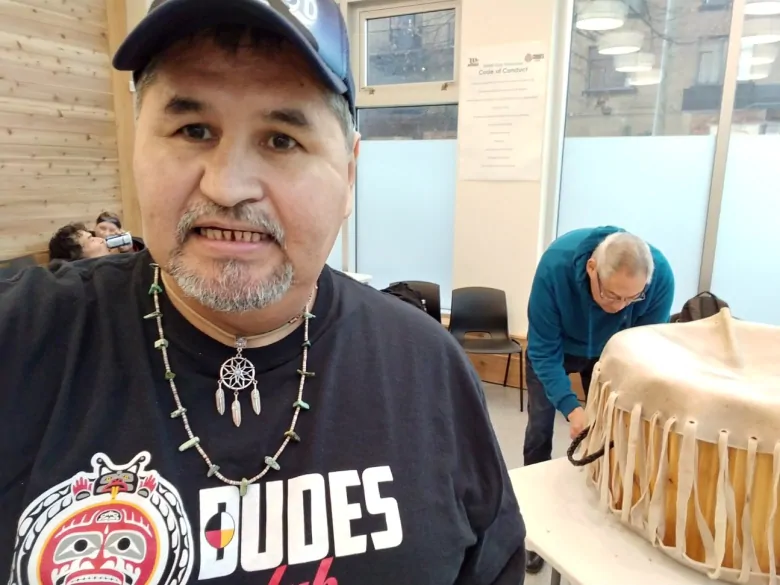'Leave your armour at the door': How bonding is helping Indigenous men heal body, mind and spirit

Every two weeks, a group of 50 or 60 men cram into a makeshift bingo hall in Vancouver’s poorest neighbourhood, the Downtown Eastside.
They share a hot meal, play bingo, get free haircuts — then they get real about their health, talking about everything from prostate cancer to sexual abuse, in sessions led by doctors and nurses.
It’s called DUDES Club, an acronym for Downtown Urban Knights Defending Equality and Solidarity.
“We have this phrase, ‘Leave your armour at the door,'” said long-time club member Robert Chippeway, 54.
“You just leave all your toxic masculinity at the door, feel free and everyone’s at the same level. And that’s where the magic happens.”
Chippeway was in rough shape when he first stumbled upon the group in 2010. After a decade of living in the Downtown Eastside, he was an alcoholic with a cocaine addiction, living with HIV and Stage 2 cirrhosis of the liver.
“My mental health was all over the place,” he recalled. “I was powerless and I felt hopelessness.”
But he was encouraged by the club’s welcoming atmosphere, so he kept returning. He credits his fellow dudes for helping get him back on his feet again. “It’s very important, crucial, to my recovery,” he added.
The program is now fielding inquiries from community health providers worldwide who wonder if the key to improving men’s mental health is as simple as good, old-fashioned male bonding.
Overcoming loneliness
The Vancouver Native Health Society started DUDES Club in 2010, after male patients at its HIV drop-in clinic repeatedly talked about being lonely.
“They all identified loneliness as their main mental health concern … it manifests in substance use, depression, anxiety, and PTSD,” said Dr. Paul Gross, a family physician and co-founder of the men’s health group.
“So, [we were] just trying to be a sanctuary, a safe space where men can come and connect.”

In addition to the bi-weekly dinner and bingo, the men take outings to sports events and go camping.
But the backbone of the program remains discussions about health. Once a year, the dudes also gather for a wellness fair, where medical tests are offered.
Gross says the club’s social aspects are essential to coaxing men to open up about health.
“There’s an expectation, constructed over centuries, of what is expected of men. Stoicism and courage in the face of any suffering. And don’t show emotion, don’t show weakness. Don’t ask for help if you absolutely don’t need it,” said Gross.
“That narrative has been responsible, we believe, for a lot of the trend over the past decades in terms of toxic masculinity, gender-based violence and harassment in the workplace.”
Brotherhood of solidarity
About two-thirds of DUDES Club members identify as Indigenous.
Sandy Lambert, a member of Tall Cree First Nation in Alberta and DUDES Club resident elder, says he’s met many Indigenous men who avoid hospitals and medical clinics, even if they require urgent care.
“They just didn’t feel any trust with the health-care system because of all the stigma and discrimination that happens. I thought, ‘Well, maybe, as a human being, I can help my brothers out there.'”
Persuading men to talk is no “overnight fix,” says Lambert, but he believes it helps to combine Western medical treatment with Indigenous healing traditions such as the medicine wheel.
“I know my people used to sit in the teepees, and the men and women would have their own talking circles. So, for generations and generations, we did that,” said Lambert.

Research suggests that the DUDES Club model shows benefits. A three-year study by the University of British Columbia found that participants’ mental, physical, emotional and spiritual health improves in the program’s safe, non-judgmental environment.
“Part of what we try to do is to encourage men to move along the spectrum from curious to serious about their health and wellness,” said Gross.
Elders and cooks receive honoraria, but the group relies primarily on volunteers, including Gross, which allows the club to operate on a budget of approximately $25,000 a year.
The program’s cost-effectiveness has led to the launch of satellite clubs in seven communities across B.C., including Kamloops, Smithers and Prince George.
‘It reconnected me to my spiritual being’
Robert Chippeway still marvels at how the brotherhood helped him clean up his health, recalling a critical moment in his recovery that took place one evening at DUDES Club.
“I stood up there and said, ‘Hey guys, this is really good for me. I’m actually one-year sober today.’ The whole group applauded … I was super proud.”

Chippeway has been sober for nearly four years, and he’s managing his HIV with medication. He also began exploring his Ojibway heritage, which he’d long felt alienated from.
“I’m more involved in singing and making drums and going to sweats and stuff like that. It reconnected me to my spiritual being,” he said.
Chippeway also reconnected with his family, eventually moving to Coquitlam to live with his brother, sister and father.
He was recently named a DUDES Club Champion, which means he helps organize dinners and plan outings for the men. Though he no longer calls the Downtown Eastside home, Chippeway still makes time for the dudes.
“Just the bonding, being in a room full of men with men, the messages from the doctor … it’s just amazing,” he said.
With files from Samantha Lui





